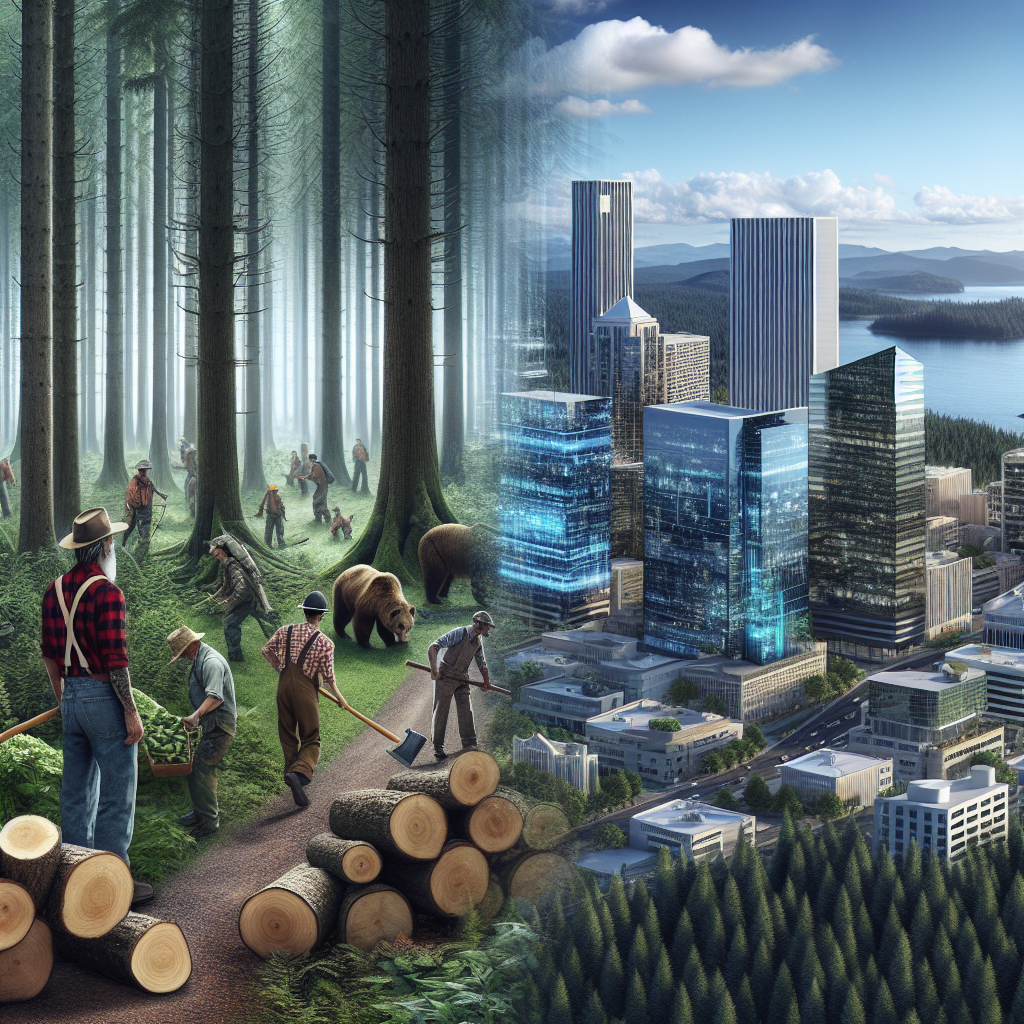Oregon’s Transformation from Timber to Tech: A Journey Through Time and Terrain
Nestled on the Pacific Northwest, bathed in the constant drizzle of its coastal rain, Oregon is a state defined by its land and its people. For decades, Oregon’s lifeblood pulsed through its timber industry – the rhythmic song of the sawdrifting out from sawmills in towns like Bend, Coos Bay, and Grant County. But over time, Oregon’s economy has been quietly shifting, gradually evolving like a Douglas fir reaching for the sky, away from its logging roots and towards technology. This redolent tale, weaving commitment to tradition with innovation, echoes from the rugged Cascades to the craft coffee hubs of Portland.
From Fir to Fiber Optics: An Ever-Changing Job Landscape
Remember the thick cedar scent, sawdust dusting the air, and the echo of loggers’ boots in mills like Freres Lumber in the Santiam Canyon? But much like the Waldo Lake’s transformation into a motorless paradise, Oregon is trading timber ghosts for digital dreams. Tech companies have settled in by the handfuls in recent years, drawn like salmon to the Willamette by our stellar quality of life and abundance of outdoorsy professionals. This trend is best seen in our very own Silicon Forest, the tech hub filter-feeding in the fertile lands between Beaverton and Hillsboro.
What started as a tiny trickle with Sequent and Tektronix has now become a veritable tech tsunami. Intel, a global giant in the semiconductor industry, has been lovingly called Oregon’s unofficial state bird, having its largest R&D site based in Hillsboro. Smaller but equally robust tech companies like Puppet, Jive Software, and Elemental Technologies have also found fertile ground in Oregon, adding their own touch to the tech-driven transformation of our economy.

Nowadays, the clatter of old typewriters has been replaced by the soothing hum of data centers, and coding languages are the new local vernacular.
The Perfect Blend: Timber-to-Tech Transition
That’s not to say we’ve pushed our timber past aside like an old raincoat during Oregon’s deceptively sunny summer (which we know full well lasts about two weeks). Our timber history, like old-growth trees in the Tillamook State Forest, still stands tall.
They say you can’t replace an old-growth forest overnight, and the same goes for jobs. The transition from timber to tech has been a slow and carefully cultivated one. Companies like Roseburg Forest Products still generate considerable revenue and employ our hardworking locals. As any Oregonian who’s battled blackberries in their backyard can tell you, things that take root here run deep.
Just like the dance of dragonflies over Trillium Lake come July, the two sectors coexist, each adding a mesmerizing layer to Oregon’s economic tapestry.
Silicon Rain: New Opportunities Sprouting Like Mushrooms
In stark contrast to the storied brick and mortar of our old logging mills, our tech scene is buzzing like bees around a huckleberry bush in full bloom. Powell’s Books might be the place where you can ‘buy anything printed’, but it’s firms like Motus that use cutting-edge tech to track transport like never before.
Tech meetups, conventions, and incubators as sprightly as early spring ferns pop up more frequently than notorious potholes on SW Jefferson. The TAO (Technology Association of Oregon) provides mentoring and resources for budding tech businesses. The same spirit of collaboration that brings neighborhoods together for Portland’s legendary block parties makes Oregon a hub of innovation and consistent breakthroughs.
Towards a Future as Tall as Mount Hood
So, we say a warm, rain-spattered ‘welcome’ to these tech companies, and invite them to join us in building a future as varied and vibrant as our beloved Saturday Market. From the peaceful Wallowa mountains to the eclectic Hawthorne district, from the mist-kissed Heceta Lighthouse to lively Rogue brewery, Oregon embraces change while holding on to its roots.
Yes, we’ve come a long way from the timber-centric economy of our past, but by embracing technology, we’ve opened up worlds of opportunities for Oregonians—just like the grand vistas unfolding from a summit at Crater Lake.
The transformation from timber to tech doesn’t ostentatize our logging past, but rather, reflects Oregon’s adaptability and unwavering spirit. Our history with and passion for the timber industry has given us a sturdy foundation, and the rise of technology promises a bright, innovative future. The transformation mirrors the diversity and resilience that are kinship to us, Oregonians. Much like one anticipates the awe-inspiring blooms of cherry blossoms at Tom McCall Waterfront Park each spring, we look forward to a future where both the timber and tech industry thrive, together forging a path forward as bold and unconventional as our beloved Beaver state.
